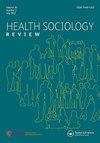护士职业认同斗争中的个体与集体策略
IF 2.5
2区 医学
Q2 HEALTH POLICY & SERVICES
引用次数: 9
摘要
摘要个体对自己的工作有意义的认知有助于他们的认同感。虽然通过工作发展身份的个体过程已经被广泛研究,但我们对社会过程如何促进这种发展知之甚少。本文试图通过研究护士对轮班结束报告中变化的反应,更好地理解通过工作发展职业身份的社会过程。两个医疗团队在瑞士一家教学医院的内科病房进行了实地观察。在观察期间,在护士轮班的关键时刻,轮班结束报告中的组织变革被引入团队,然后实施。在这些变化之前,护士们使用个人和集体策略来使他们的工作有意义,并确认他们的职业身份。护士们在下班报告中单独寻求同事的认可。护士们集体求助于职业价值观和话语,将他们与其他职业群体区分开来。然而,轮班报告的变化威胁到了这些策略。本文展示了护士如何使自己的工作在他人眼中有意义,以及他人的认可如何有助于护士的职业认同感。本文章由计算机程序翻译,如有差异,请以英文原文为准。
Individual and collective strategies in nurses’ struggle for professional identity
ABSTRACT Individuals’ perception of their work as meaningful contributes to their sense of identity. While individual processes of identity development through work have been studied extensively, we know little about how social processes may contribute to this development. This article seeks to better understand social processes of professional identity development through work by examining nurses’ reactions to changes in their end of shift reports. Field observations were conducted with two healthcare teams on the internal medicine ward of a Swiss teaching hospital. During the observation period, organisational changes in end of shift reports, a crucial time in nurses’ shift, were introduced to the teams and then implemented. Before the changes, nurses used individual and collective strategies to make their work meaningful and to affirm their professional identity. Individually, nurses sought recognition from their co-workers during end of shift reports. Collectively, nurses resorted to professional values and discourses that set them apart from other professional groups. However, changes in shift reports threatened these strategies. This article shows how nurses make their work meaningful in the eyes of others and how others’ recognition contributes to nurses’ sense of professional identity.
求助全文
通过发布文献求助,成功后即可免费获取论文全文。
去求助
来源期刊

Health Sociology Review
Multiple-
CiteScore
7.50
自引率
0.00%
发文量
14
期刊介绍:
An international, scholarly peer-reviewed journal, Health Sociology Review explores the contribution of sociology and sociological research methods to understanding health and illness; to health policy, promotion and practice; and to equity, social justice, social policy and social work. Health Sociology Review is published in association with The Australian Sociological Association (TASA) under the editorship of Eileen Willis. Health Sociology Review publishes original theoretical and research articles, literature reviews, special issues, symposia, commentaries and book reviews.
 求助内容:
求助内容: 应助结果提醒方式:
应助结果提醒方式:


